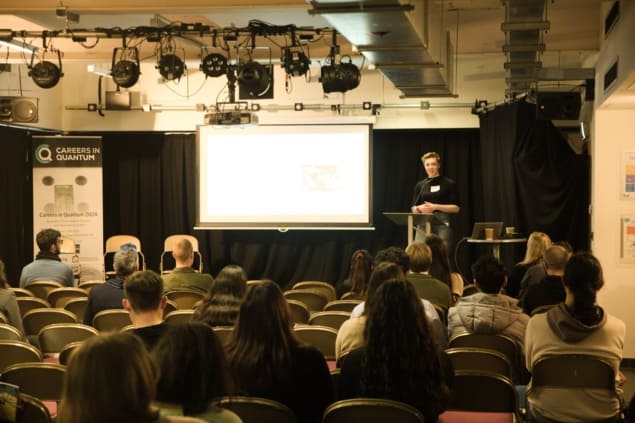
Earlier this month, I attended the Careers in Quantum fair at the University of Bristol, organized by the Quantum Engineering Centre for Doctoral Training (CDT). There was an enthusiastic buzz in the air — perhaps unsurprising considering that last year the UK government announced £2.5bn funding for developing quantum technologies as part of the government’s National Quantum Strategy, which includes a plan to double the number of quantum CDTs. The event was led by students in the CDT and featured stalls from nearly 30 quantum companies as well as a programme of talks and discussions.
The day was kicked off by Winfried Hensinger, a researcher at the University of Sussex and co-founder of Universal Quantum. The company’s goal is to build a million-qubit quantum computer, with Hensinger saying he wanted Universal Quantum to be “the AWS [Amazon Web Services] of quantum computing”. The challenge of scaling up quantum computers would come up again and again, and Hensinger’s ambitious talk – in which he revealed he’d wanted to build a quantum computer ever since his PhD – set the tone for the event.
The first panel discussion examined starting a quantum company. Immediately noticing the all-male line-up, the panellists made a point of encouraging female founders, and the gender imbalance was luckily not reflected in the rest of the day. Two panellists – Josh Silverstone of Qontrol and Dominic Sulway of Light Trace Photonics – had spun out their firms from their PhDs.
Although a doctorate is great for developing your technical knowledge and skills, the consensus was that a PhD is not always necessary for success in the sector. That notion would later be echoed in the last talk of the day by Harry Bromley from Aegiq, who spoke about his decision to pursue a career in quantum straight out of his master’s degree.
The importance of communication skills for pitching to investors and describing technical concepts in an accessible way was also highlighted – I was partly there to deliver a short presentation promoting the Physics World PhD contributor network, so I hope this is something that attendees took to heart.
The afternoon began with another panel discussion, this time on the near-term applications of quantum technology. Andrew Weld of QLM predicted that in 10 years, “no-one will be talking about quantum”, because the technology will be so widespread that “quantum technology” will become a meaningless phrase.
The event was dominated by start-ups, with lots of discussion of the challenges of recruitment, attracting investment and finding customers. However, one participant on this panel was Zoe Davidson, a research specialist in optical networks for British Telecom (BT) – which employs more than 100,000 people. She spoke about the company’s projects and what it’s like to deploy cutting-edge technology in a big organization.
The rest of the talks included several University of Bristol alumni (and previous conference organizers) who had returned as speakers, discussing their work at ORCA computing and Wave Photonics. Most of the conference was UK-centric, but there were also talks from Sofie Lindskov Hansen of Danish Sparrow Quantum and Jonas Philips of the Germany-based Quix Quantum – with Philips emphasizing the need for a European quantum supply chain.
Doing a PhD in quantum seems like a safe bet in terms of landing a job, but students still have a lot of choices to make about their futures. Based on the number of speakers who had spun out a company from their research, it’s likely that some of the students wandering around the hall, chatting to companies, and picking up free pens might be sitting on the next big quantum start-up.



